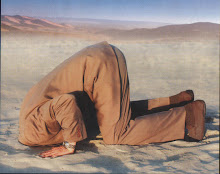
blindness by Josee Saramago was recommended and lent to me by a new good friend when i said i was loving south american authors and had a thing for disaster/apocolyptic movies that involved diseases (think outbreak and 28 days later). he was right, the book was right up my alley; i found it both chilling and powerful.
the prose is stripped down and unencumbered. saramango never tells the reader the city or the year that the story takes place and the characters are never named beyond physical identifiers or professions - the girl with the dark glasses, the boy with the squint, the first blind man, the doctor. this gives us a sense that these things matter little, it could be any place, any time, any people.
the story gets underway when the first man becomes blind while waiting at a traffic light. unlike traditional blindness the man sees the world as white rather than black. after being helped home, the man visits an ophthalmologist with his wife, but the puzzled doctor is unable to give them any answers. the next day, it becomes apparent that the white blindness is an infectious disease - many more people are blind, including the eye doctor, his clinic patients and the first blind man's wife. the state steps in to quarantine the blind. they are sent to an old asylum and guarded by the military who are ordered to shoot anyone who tries to leave.
more and more blind people are brought to the asylum everyday and there is no one to help them do baic human things. food deliveries are infrequent and often do not take into account the added number of blind that continue to arrive. toilet and cleaning facilities are limited and quickly soiled by people who cannot see what they are doing. no medicines are available and there is no easy way to bury the dead.
amongst all of these blind people there continues to be one sighted individual. the doctor's wife who pretended to be blind so that she would be taken to the quarantine facility with her husband never loses her sight throughout the story. instead she is the only visual witness to the horror and carnage that is humanity at it's basest level. she uses her immunity to blindness to shepherd her husband and the blind charges in her ward so that they might live in as much comfort and safety as is possible in the circumstances.
i found the story revealing - it is how i imagine society would deteriorate in such a situation. the small ward containing the doctor and his seeing wife maintained a commitment to dignity and turned to each other to get through an intolerable situation. they thought of others instead of only themselves. however they were a clear minority.
there was also a group on the opposite end of the spectrum that sought to take advantage despite being blind themselves. this group took control of the only resource of any value to the blind detainees, the food supply. with the other inmates at their mercy and no hope of outside intervention this group traded valuables for food and when material valuables ran out, they demanded women for sexual services.
between these two extremes was the rest of humanity - the 90% of people who were self-interested, scared and opportunistic. exactly how most of us would be in a crisis. it terrifies me that when things go wrong, when one of our basic expectations as a person is removed, it is almost as if our humanity falls away. we forget what it is that makes us human. or even further, is humanity a luxury item? something that expresses itself only when we feel our basic needs are taken care of first.
